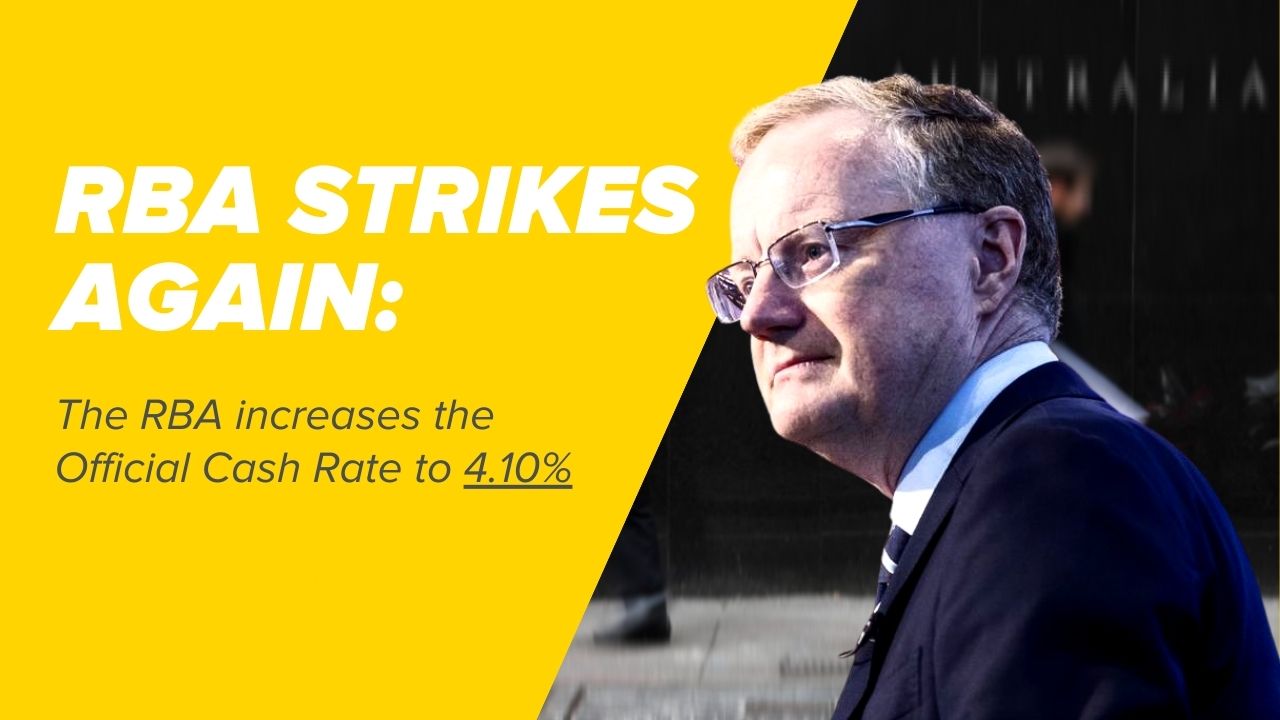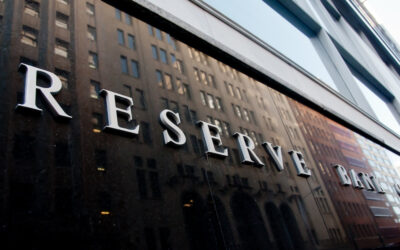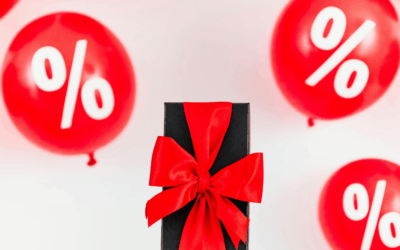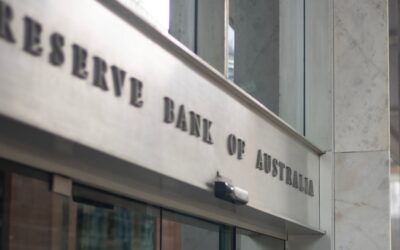In this article:

Despite mounting public scrutiny, the Reserve Bank of Australia has decided to increase the official cash rate a further 0.25%, to 4.10%. This marks a cumulative increase in the cash rate of 4% since May 2022.
Many of Australia’s leading economists were unanimous in their assessments, suggesting that the RBA should have paused the rate hiking cycle to allow them some time to assess the impacts of previous rate hikes on the Australian economy and to relieve the pressure on households.
NAB’s Chief economist, Alan Oster went as far as cautioning the RBA not to “kill the economy”.
“I think it might be useful for the Reserve Bank to take some time and just assess so that you don’t essentially kill the economy trying to chase inflation. But ultimately I think the Reserve needs more to do,” Oster told Nine.
“I think whatever happens, whether today or next month, you are going to get at least one more rate rise and possibly two.”
Ultimately, according to Oster, “The Australian economy will suffer from interest rate increases. We don’t expect to see much growth at all for the rest of the year.”
“A lot of Hysteria Around at the moment”
During the recent episode of the Property Insights podcast, Mark Bouris discussed inflation and rate hikes with economist Stephen Koukoulas. Bouris mentioned that there is a lot of “hysteria around at the moment” regarding the stubborn nature of inflation and the RBA’s continued efforts to control inflation through interest rates.
However, Koukoulas said that the trend in inflation suggests that it’s on the mend and heading in the right direction.
“When you boil it down, inflation is falling in trend terms,” said Koukoulas.
“It’s not quite as low as we’d all want it to be and we’re still some way from getting to the 2 – 3% annual inflation target that the Reserve Bank is looking at, but they’re happy with that because the momentum is in the right direction.
In it’s press release, the RBA reiterated that they’re focused on inflation, but cautioned that, “the path to achieving a soft landing remains a narrow one. A significant source of uncertainty continues to be the outlook for household consumption. The combination of higher interest rates and cost-of-living pressures is leading to a substantial slowing in household spending.”
“Inflation in Australia has passed its peak, but at 7%, it’s still too high and it will be some time yet before it is back in the target range. This further increase in interest rates is to provide greater confidence that inflation will return to target within a reasonable timeframe.”
“High inflation makes life difficult for people and damages the functioning of the economy. It erodes the value of savings, hurts family budgets, makes it harder for businesses to plan and invest, and worsens income inequality. And if high inflation were to become entrenched in people’s expectations, it would be very costly to reduce later, involving even higher interest rates and a larger rise in unemployment. Recent data indicate that the upside risks to the inflation outlook have increased and the Board has responded to this.”
How does this month’s rate hike impact mortgage holders?
With the latest cash rate increase, say for example your home loan interest rate were to increase from 6.00% to 6.25%, you would experience an increase of $16.17 per month, per $100,000 borrowed, in terms of minimum monthly repayments over a 30 year loan term. For example:
- Repayment increase on a $400,000 loan = $64.68
- Repayment increase on a $600,000 loan = $97.02
- Repayment increase on a $800,000 loan = $129.36
What is going on with House Prices?
Despite the economic concerns relating to inflation, interest rates and the cost of living, Australia’s property market has continued to rebound. Property prices on average fell for 11 months consecutively up until February this year, according to CoreLogic’s Home Value Index (‘HVI’), however, March saw an unexpected turn in dwelling values, and this trend has continued for a third successive month.
CoreLogic announced that the HVI, “recorded a third consecutive monthly rise, with the pace of growth accelerating sharply to 1.2% in May.”
“After finding a floor in February, home values increased 0.6% and 0.5% through March and April respectively.”
“Sydney continues to lead the recovery trend, posting a 1.8% lift in values over the month, recording the city’s highest monthly gain since September 2021. Since moving through a trough in January, home values have risen by 4.8%, or the equivalent of a $48,390 lift in the median dwelling value.”
Supply and Demand in Conflict
According to Research Director, Tim Lawless, the trend in house prices is simply a result of persistently low levels of housing supply, in conflict with increasing housing demand.
“Advertised listings trended lower through May with roughly 1,800 fewer capital city homes advertised for sale relative to the end of April. Inventory levels are -15.3% lower than they were at the same time last year and -24.4% below the previous five-year average for this time of year,” he said.
“With such a short supply of available housing stock, buyers are becoming more competitive and there’s an element of FOMO creeping into the market. Amid increased competition, auction clearance rates have trended higher, holding at 70% or above over the past three weeks. For private treaty sales, homes are selling faster and with less vendor discounting.”
The issue was a particular concern for Bouris and Koukoulas this month, with Koukoulas telling Bouris “to be careful what you wish for” when it comes to Australia’s housing supply.
Australia is experiencing rapid population growth, with increased immigration contributing significantly to the demand for housing supply.
Koukoulas said, “There’s a big increase in immigration. That’s partly a catch-up from COVID when no one came into Australia, and we know that the labour market is short of skilled workers. I think that’s an important part of Australia – we’re a good immigration country. However, be careful what you wish for, in a sense, because like good red wine, you can have too much.”
“Immigration is good in moderation, but what we’re seeing happening right now, building approvals are in free fall. Not many people are building property right now, whether it be apartments, townhouses, even individual houses, we’re seeing pretty weak numbers in new supply, whilst our population is booming.”
“So even though interest rates have gone up 375 basis points since May last year, and that dampens how much an individual can borrow, there’s a big issue with the number of people coming in when housing supply is squeezed.”
Compounding this supply and demand issue is the increase in students entering Australia, as Koukoulas said: “It’s another [relatively] good thing for the economy – foreign students are studying in Australia again, it’s great. But they’re renting apartments near where all the university campuses are. So if you’re looking for a little apartment near all the campuses around capital cities, there’s nothing there. And that feeds into higher prices too.”
The big question on everyone’s mind, as Koukoulas pointed out: “Will we really achieve more if we continue to hike rates? Or will we run the risk of running into a hard landing?”
We will have to wait and see.
What can you do?
YBR Caroline Springs Branch Principal David Pettit said that you’re not alone if you’re feeling anxious about the latest rate hike.
“With this week’s announcement to increase the Cash Rate, and with the lenders eager to pass this increase on to you, it is completely understandable that there would be a level of stress and anxiety about what’s going on. Trust me, you’re not alone.
“The good news is that there are things that can be done to relieve some of that stress and anxiety. With 15 years of experience as an accountant, I can help you analyse your expenses, and look at where changes could be made to your repayment structure to get through these turbulent times.”
“As a mortgage broker, we are laser focused on what’s best for you to help you achieve your goals.”
“My role is to put in the time and research to provide you with three or four options that meet you needs. Then we have a conversation about what suits you.”
“That conversation is not about me telling you what to do, but rather, presenting the options based on my knowledge, expertise, the lender’s policies and unique understanding of your personal situation.”
We also asked YBR North Sydney Branch Principal Tom Haggie what his advice for mortgage holders would be:
“With unprecedented interest rate increases over the last 12 months here are 3 strategies to consider:
- Develop a good understanding of where your money is going and to set up a firm budget. Look to cut back any non-essential spending such as dining out or entertainment.
- Speak to your current lender or broker and they may be able to help with modifying your loan for a period or time and work with you to make sure you are not paying more interest than absolutely necessary.
- Take care of yourself – engage in activities that help you relax and reduce stress.”
If you need support during this rate hiking cycle, contact us today to be put in touch with an experienced mortgage broker, who will act in your best interests to ensure you’re getting the best deal possible on your home loan.



